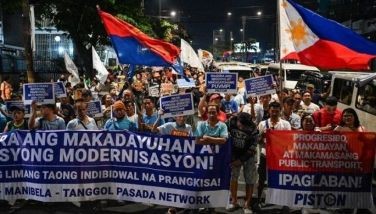Senate under threat by people’s initiative – Koko
MANILA, Philippines — The Resolution of Both Houses No. 6 (RBH6) pushing for the amendment of the 1987 Constitution was more for “self-preservation” of the Senate under threat by the people’s initiative (PI) initiated by the House of Representatives, Senate Minority Leader Aquilino Pimentel III said.
“It is a self-preservation measure… the authors feel that the Senate is under threat because of PI. The suspect behind it is the House of Representatives,” Pimentel said yesterday in an interview over dzBB.
Senate President Juan Miguel Zubiri led the filing of RBH6 proposing the amendment of specific economic provisions of the Constitution, including public services, the education sector and advertising industry by legislation of a law instead of full-scale Charter change.
“This is to avert a constitutional crisis between the House of Representatives and the Senate. And to make it clear that there are no other planned provisions or amendments on any other thing but purely economic in nature,” Zubiri said.
Zubiri said he is hoping that RBH6 will put to rest the PI being pushed by some groups. RBH6 was also signed by Senate President Pro-Tempore Loren Legarda and Sonny Angara.
However, Pimentel said the RBH6 was a waste of time and that the Senate should concentrate on important issues that affect ordinary Filipinos, military and uniformed personnel pension funds (MUP) and maritime zones law instead of Charter change.
“But it’s sad when the session returns, Cha-cha is the issue,” Pimentel said.
Former finance secretary Benjamin Diokno had previously warned of an impending “fiscal collapse” due to the escalating annual payouts to MUP. The current year’s MUP pension payout stands at approximately P213 billion and is projected to reach the P1-trillion mark by 2035.
Meanwhile, maritime zones law would help clearly delineate the geographical extent of the country’s maritime jurisdictions and define the applicable powers and authorities over Philippine marine waters consistent with international law.
No to political Cha-cha
Pimentel said that he would oppose the amendment for political provisions in the Constitution, as the majority of the senators would support an effort to amend only the economic provisions.
“Knowing my colleagues in the Senate, whether generally speaking they like Cha-cha or not, I don’t think so. They only preferred the (amendment of the) economic provisions. If they change their mind and are open to changing the Constitution, I think there are more senators in favor of (amending) the eco provision. As for me, I will oppose the amendment for political provision,” he added.
He said three issues should be clarified. “First is the motivation, why file the resolution? Do we really want Cha-cha or are we avoiding something? Just political maneuver, motivation and timing. Second is the procedure, there must be rules. Third is the substance of the proposal, including public utilities, education, and the advertising industry. We will ask. How many jobs does it create?”
2025 polls to push through
Senatorial or midterm elections in May 2025 will push through as scheduled despite efforts to amend the Constitution through people’s initiative, Rep. Joey Salceda, chairman of the House ways and means committee assured the public.
“Mind you, we are not doing anything outside of the Constitution. The point is: this PI should be reasonably actionable before the 2025 elections. By 2025, there will be elections. Of course, there will be elections,” Salceda said.
“I think the PI is already inevitable,” Salceda said in a previous briefing. “We have achieved the signing of signatures in just three days. We thought 20 percent was hard, but it was very easy.”
Salceda likewise expressed optimism about the seven-month timeline of the initiative, saying the projected July 8 plebiscite before the third State of the Nation Address of President Marcos is achievable.
The economist-lawmaker repeated his long-time push for Charter change, pointing out that Manila started lagging behind its ASEAN neighbors as early as 1997.
‘Anti-worker and anti-people’
The Center for Trade Union and Human Rights (CTUHR) has, however, expressed strong objection to amending the Constitution, saying such move was anti-worker and anti-people.
“Even the declared objective of Cha-cha – changing the economic provisions of the Constitution to further open up the economy to foreign investors – is also anti-worker and anti-people,” the group said in a statement.
CTHUR said further opening to foreign investors means more intense participation in the global race to the bottom, in which developing countries race among each other to offer labor that is cheapest, most repressed, and therefore most denied of rights to big foreign employers.
The group also expressed fear that removing limits to foreign ownership of land and other essential sectors will lead to removal of the provisions of the 1987 Constitution that guarantee labor rights such as the right “to self-organization, collective bargaining and negotiations, and peaceful concerted activities, including the right to strike in accordance with law” as well as “security of tenure, humane conditions of work, and a living wage.”
CTHUR said the Marcos government wants to take advantage of the current weakness of the labor movement to ram through its Cha-cha and remove or reduce labor rights provisions.
1k voters per precinct
Commission on Elections (Comelec) Chairman George Garcia said the poll body opted to raise the maximum number of registered voters to 1,000 per clustered precinct due to budgetary constraints.
Under Comelec Resolution 10965, each clustered precinct shall have an unlimited number of established precincts but not more than 1,000 voters.
In the last May 2022 national and local elections, there are not more than 800 registered voters per clustered precinct.
With a lower budget for the 2025 elections, Garcia said the Comelec was prompted to reduce the number of voting machines, ballot boxes, election paraphernalia and Electoral Board members to be deployed.
According to Garcia, 800 registered voters per clustered precinct require P27 billion whereas 1,000 registered voters only need P22 billion. — Mayen Jaymalin, Delon Porcalla
- Latest
- Trending




























